Organization of World Heritage Cities (OWHC)

Credits: OWHC
The Organization of World Heritage Cities (OWHC) is an international non-profit, non-governmental organization which brings together the cities from around the globe that have within their territory a site that has been inscribed on the UNESCO World Heritage List. The OWHC was created in 1991 to assist member cities to adapt and improve their conservation and management methods. The Organization represents a collective intelligence on all issues related to the urban management of a World Heritage property and connects with more than 300 cities having on their territory a site inscribed on the UNESCO World Heritage List. All of these cities have a total population of over 164 million people. They are represented in the Organization by their mayor, with the active participation of elected municipal officials and heritage managers. The Regional Secretariat for Eastern and Central Europe was chaired by Budapest until 2020.
You can find out more on the unique world heritage sites of Budapest and the organization here.
The League of Historical Cities (LHC)

Credits: The League of Historical Cities
The League of Historical Cities (LHC) was established in Kyoto, Japan in 1987. It aims to strengthen affiliations between historic cities to exchange knowledge and experience and ultimately, world peace by deepening mutual understanding. The World Conference of Historical Cities has promoted borderless and constructive dialogue among historical cities since its founding. Today the League is composed of 118 members from more than 60 countries and regions of five continents. The City of Budapest became member of the LHC in 1994.
You can find out more on the organization here.
European Historic Thermal Towns Association (EHTTA)

Credits: EHTTA
The European Historic Thermal Towns Association (EHTTA), founded in 2009, is a membership organization representing historic thermal spa towns across Europe. Today, EHTTA has grown from its original 6 Founder Members to a healthy non-profit association, a network of 50 members in 17 countries. Its main objective is to protect and enhance the thermal, artistic and cultural heritage throughout Europe. Since 2010, EHTTA is certified by the Council of Europe to manage the European Route of Historic Thermal Towns, as part of the Cultural Routes program.
Located at the crossroads of Europe, Budapest is a cosmopolite capital whose most popular attractions are undoubtedly the baths. Officially recognized as a "Spa City" since the 1930s, Budapest is the only capital city in the EHTTA network that is also a spa center, with the greatest number of healing thermal spring waters. The City of Budapest is an associate member, represented by its company Budapest Spas Plc. in the EHTTA network.
You can find out more on the unique and rich thermal bath culture of our city here and here.
Eurocities
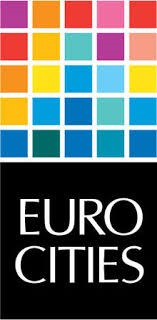
Credits: EUROCITIES
EUROCITIES is the major European city-network, actively engaging 140 member cities and 45 partner cities. Through six thematic forums, a wide range of working groups, projects, activities and events, it provides a platform for its members to share knowledge and pool resources. In addition, it advises European institutions on urban policy and shape the opinion of key European policy-makers in Brussels.
Budapest has been a member of the organization since 1996, at one point presiding over its Economic Development Forum, and having been an Executive Committee (CP) member in three consecutive terms. We have worked actively in the organization's Social Affairs Forum, Mobility Forum, Environment Forum, and - more recently – in the Knowledge Society Forum.
For further information please visit the official website of Eurocities.
Lighting Urban Community International (LUCI)
 Credits: LUCI
Credits: LUCI
LUCI (Lighting Urban Community International) is the international network of cities on urban lighting, bringing together over 70 member towns and cities worldwide that use light as a tool for social, cultural and economic development. It also includes over 40 associated members from the lighting industry, design agencies and research institutes. Budapest is a full member of the mom-profit organization and is represented by its public lighting company BDK. The "Budapest 2030" long-term urban development plan features the first lighting master plan of the city aimed at the sustainable and energy-efficient modernization of public and decorative lighting. The Smart City Vision of Budapest adopted by the General Assembly in 2017 promotes the installation of smart technologies and solutions in lighting.
You can find out more information on the organization and on Budapest lighting management here and BDK Lighting Plc.
Council of Danube Cities and Regions (CODCR)

Credits: CODCR
The Council of Danube Cities and Regions was officially founded in Budapest at the 4th European Conference of the Danube Cities and Regions in 2009, building on the initiative of Ulm. The CODCR is a major intermunicipal and interregional network to become an example of cross-border cooperation to create an integrated European Danube region from the Black Forest to the Black Sea. With its political Head Office in Ulm, the Council of Danube Cities and Regions is a bridge that links European, regional and local institutions to the academic, business, financing networks and other representatives of the civil society.
For more details please visit the website of the CODCR.
World Tourism Cities Federation (WTCF)

Credits: WTCF
World Tourism Cities Federation (WTCF), established in 2012 under the initiative of Beijing, is the world's first international tourism organization focusing on cities. WTCF has now grown into an international tourism organization with a total of 218 members, including 145 cities – with Budapest as one of its founding members, 73 institutional members and 6 branches. Its institutional members include travel agencies, mass media, airports, airline companies, hotel groups, cruise companies and financial firms. WTCF provides services to its members that cover the entire tourism industrial chain. It aims to facilitate exchanges and cooperation among members, spread the experience of tourism city development, promote tourism products and resources, and contribute to the development and prosperity of world tourism industry. The headquarters and Secretariat of WTCF are based in Beijing, and Chinese and English are its official languages.
Find out more on WTCF and the tourism of Budapest.
World Tourism Organization (UNWTO)
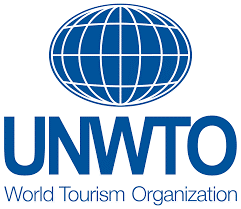
Credits: UNWTO
The World Tourism Organization (UNWTO) is the United Nations agency responsible for the promotion of responsible, sustainable and universally accessible tourism. As the leading international organization in the field of tourism, UNWTO promotes tourism as a driver of economic growth, inclusive development and environmental sustainability and offers leadership and support to the sector in advancing knowledge and tourism policies worldwide. Representing the City of Budapest, BFTK Budapest Festival and Tourism Centre Non-profit Limited Liability Company is an affiliate member of UNWTO. At the initiative of the United Nations World Tourism Organization, the tourism industry has celebrated World Tourism Day on 27 September every year since 1980. In 2018, World Tourism Day was hosted by Budapest.
Find out more on the tourism of Budapest here.
Under2 Coalition Platform

Credits: The Climate Group
The Under2 Coalition brings together more than 220 governments who represent over 1.3 billion people and 43% of the global economy. The Under2 Memorandum of Understanding (MOU) is a climate agreement for subnational governments. The City of Budapest joined the Under2 Coalition Platform by signing the Under2 Memorandum of Understanding in 2016. By signing the agreement each government commits to limiting emissions to 80-95% below 1990 levels, or to below 2 annual metric tons per capita, by 2050 – the level of emission reduction necessary to limit global warming to under 2°C by the end of this century. Although not legally binding, the Under2 MOU demonstrates a clear and lasting commitment from signatories to reduce emissions in the decades to come. Budapest was the first in the Central and Eastern European region to sign the MOU.
Materials:
The Under2 MOU is available here: English A4
City of Budapest – Appendix English
Further information on the Under2 Coalition.
Global Covenant of Mayors for Climate and Energy
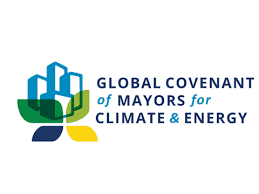
Credits: GCoM
The Global Covenant of Mayors for Climate and Energy (GCoM) is an international coalition of cities and local governments with a shared long-term vision of promoting and supporting voluntary action to combat climate change. GCoM, established in 2016 by bringing formally together the Compact of Mayors and the European Union's Covenant of Mayors, serves cities and local governments by mobilizing and supporting ambitious, measurable and planned climate and energy action in their communities. It is the broadest global alliance committed to climate leadership, involving more than 9,000 cities and local governments.
Focusing on three pillars: mitigation, adaptation and increased access to secure, affordable and sustainable energy, the GCoM supports implementation of ambitious, measurable and locally relevant solutions, captured through climate action plans developed, implemented and monitored by cities and local governments. Plans, targets and achievements are reported and publicly available on GCoM reporting platforms, such as the carbon Climate Registry (cCR). Budapest has been a member of both climate alliances: the Covenant of Mayors (since 2009) and the Compact of Mayors (since 2015).
To find out more on the integrated network of GCoM, please visit here.
International Council for Local Environmental Initiatives (ICLEI)

Credits: ICLEI
ICLEI – Local Governments for Sustainability is a global network of more than 1,750 local and regional governments committed to sustainable urban development. Active in 100+ countries, ICLEI influences sustainability policy and drives local action for low emission, nature-based, equitable, resilient and circular development. ICLEI helps cities, towns and regions anticipate and respond to complex challenges, from rapid urbanization and climate change to ecosystem degradation and inequity. Budapest joined the ICLEI network in 2019.
To find out more, please visit the website of ICLEI.
Global Lead City Network on Sustainable Public Procurement (GLCN)

Credits: GLCN
The Global Lead City Network on Sustainable Procurement (GLCN) is a group of 14 cities committed to drive a transition to sustainable consumption and production by implementing sustainable and innovation procurement. All participating cities act as ambassadors of SPP to lead to a resource efficient, low carbon and socially responsible society.
The GLCN enables leading cities in the field of sustainable public procurement (SPP) to showcase ambitious, quantified targets and achievements in four priority sectors; develop capabilities to implement sustainable purchasing practices; help develop a supportive political framework for implementation; and foster the role of public procurement for global sustainable development. Budapest became member of the network in 2015. Upon accession to GLCN, Budapest undertook the task to develop a comprehensive public procurement strategy.
For more information on the GLCN network, please visit here.
PROCURA+ European Sustainable Procurement Network

Credits: Procura+
Initiated and coordinated by ICLEI, Procura+ is a network of European public authorities and regions that
connect, exchange and act on sustainable and innovation procurement. By knowledge and experience, the network provides advice, support and publicity to any public authority that wants to implement sustainable and innovation procurement. Participants of the Procura+ Network have been able to increase the number and effectiveness of their sustainable procurement. Budapest has been a member since 2018.
Further information available here.
United Cities and Local Governments (UCLG)

Credits: UCLG
The United Cities and Local Governments is the largest organization of local and regional governments in the world with over 240,000 members in over 140 UN Member States. Since its founding in 2004, UCLG is headquartered in Barcelona (the World Secretariat, Metropolis & UCLG Regions). UCLG is de facto representing over half the world's population across seven world regions: Africa, Asia-Pacific, Euroasia, Europe, Middle East & West Asia, Latin America and North America. The organization's work programme focuses on increasing the role and influence of local government and its representative organizations in global governance; and becoming the main source of support for democratic, effective, innovative local government close to the citizen. The City of Budapest became full member of the organization in 2016.
For more information on the mission and activities of UCLG.
UNESCO Creative Cities Network
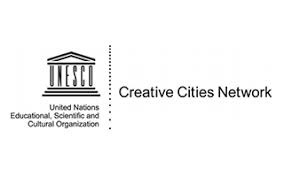
Credits: UCCN
The UNESCO Creative Cities Network (UCCN) was created in 2004 to promote cooperation with and among cities that have identified creativity as a strategic factor for sustainable urban development. The 246 cities which currently make up this network work together towards a common objective: placing creativity and cultural industries at the heart of their development plans at the local level and cooperating actively at the international level.
In 2015, Budapest joined the Creative Cities Network as a "City of Design". Budapest is considered as an incubator for start-ups in the field of design, making it the fastest growing sector of the local creative economy. The city has a comprehensive vision of design, which is seen as a driving force for sustainable urban development.
Further information here.
Cities Today Institute (CTI)
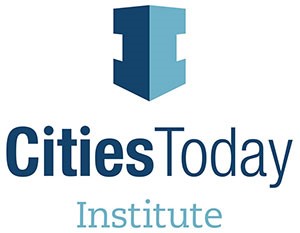
Credits: Cities Today Insitute
Budapest joined the international organization this year. CTI's mission is to help community members regulate, develop strategies, organize and implement projects through leadership forums, peer-to-peer mentoring and a shared research library.
CTI was established in September 2019 as part of a 9-year-old journal titled Cities Today. The formation of the organization has been preceded by a number of roundtable events over the past four years, with more than 170 cities represented. The organization was created by cities to support cities, but members can also reach universities (e.g. Arizona State University), research institutes, investors, and multinational companies through the organization. In their work, members adhere to guidelines, such as equal opportunities, liveable public spaces, transport safety, mobility for all, data-driven design, and digitization.
More information about CTI's activities and mission can be found here.
Energy Cities
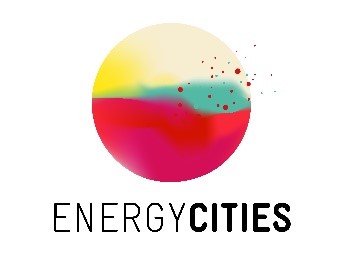
Credits: Energy Cities
Budapest joined the organization this year, in which cities and their related organizations work together in the field of energy policy. The Energy Cities organization was founded in 1990 and now has more than 1,000 cities listed as members. One of its most noteworthy achievements is the establishment of the Covenant of Mayors, of which Budapest is also a member. The organization aims to support cities in the following areas: energy efficiency, renewable energy, mitigation, regional policy and funding
More information about the organization's activities can be found here.
Accession in progress:
C40 –Large Cities fighitng climate change

Credits: C40
C40 is an organization set up by major cities around the world to fight climate change. The network promotes effective cooperation between cities, the sharing of knowledge on the subject, and the launch of major, measurable and sustainable projects against climate change. The organization includes more than 90 of the world's largest cities, representing more than 650 million people and thus accounting for a quarter of the global economy. Budapest's accession negotiations are ongoing.
More information about the C40's activities can be found here.
International recognitions:
Budapest - 2019 European Capital of Sport

Credits: ACES
The European Capitals of Sport Association granted Budapest with the title „2019 European Capital of Sport".
ACES Europe is a non-profit association based in Brussels which assigns every year „the European Capital of Sport" title, an initiative that has received the recognition of the European Commission in the White Paper (Art. 50). The allocation of these recognitions is done by ACES Europe, according to the principles of responsibility and ethics, being aware that sport is a factor of aggregation of the society, improvement in the quality of life, psycho-physical well-being and complete integration within social classes in the community. In addition, ACES Europe is an official partner of the European Commission in the European Week of Sport.
Further information here.
Budapest – 2019 European Best Destination
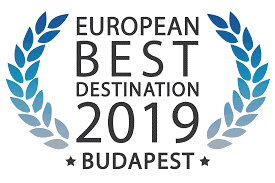
Credits: EBD
Budapest was titled „European Best Destination 2019" as the winner of an annual competition to find the best destination in Europe. In the 2019 running of this annual project, Budapest competed with the likes of Athens, Vienna, Berlin, Paris, London and Florence. According to EBD organizers, 77% of the votes were submitted from outside Hungary, including the UK, US, Germany, France, Austria and Italy.
This international contest to promote European tourism and culture has been going for ten years. Budapest only joined in 2018, finishing eighth straight away. EBD is run in close collaboration with city and tourism offices across Europe and the EDEN network set up by the European Commission. EDEN is a platform for exchanging good practice in sustainable tourism on a European level and for promoting contact between award-winning destinations. The winner of the contest receives a whole year's promotion on the EBD website, in international media and on social media sites. This new title now held by Budapest should increase the number of tourists visiting the city.
Budapest always welcomes you!
Watch the video 'Budapest awaits!' here: https://youtu.be/W8IDxVQChJU
You can find further information on visiting Budapest here.